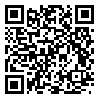Volume 11, Issue 4 (2-2025)
J Jiroft Univ Med Sci 2025, 11(4): 1757-1767 |
Back to browse issues page
Download citation:
BibTeX | RIS | EndNote | Medlars | ProCite | Reference Manager | RefWorks
Send citation to:



BibTeX | RIS | EndNote | Medlars | ProCite | Reference Manager | RefWorks
Send citation to:
Zareipour M, Akbarbegloo M, Talebian Z, Karimi M. Examining the Determinants of Fever Control Based on the Theory of Planned Behavior and its Relationship with Fever Phobia in Parents of Children Referred to Comprehensive Health Centers in Khoy City, 2023. J Jiroft Univ Med Sci 2025; 11 (4) :1757-1767
URL: http://journal.jmu.ac.ir/article-1-816-en.html
URL: http://journal.jmu.ac.ir/article-1-816-en.html
1- Assistant Professor, Department of Public Health, Khoy University of Medical Sciences, Khoy, Iran
2- Assistant Professor of Nursing, Department of Pediatric Nursing, Student Research Committee, Khoy University of Medical Sciences, Khoy, Iran ,m_Akbarbegloo@khoyums.ac.ir
3- Student Research Committee, Khoy University of Medical Sciences, Khoy, Iran
2- Assistant Professor of Nursing, Department of Pediatric Nursing, Student Research Committee, Khoy University of Medical Sciences, Khoy, Iran ,
3- Student Research Committee, Khoy University of Medical Sciences, Khoy, Iran
Abstract: (2014 Views)
Introduction: The parents' weakness in controlling the child's fever and the existence of perceptual mistakes cause fear and worry. Among the widely used theories in determining the effective factors and predicting the emergence of individual behavior is the theory of planned behavior. Therefore, this study aimed to investigate the determinants of fever control based on the theory of planned behavior and its relationship with fever phobia.
Materials and Methods: In this descriptive-analytical study, 278 parents of children under six years old referring to comprehensive health centers in Khoy city, 2023, were selected through multi-stage sampling. The data collection tools were demographic questionnaire, fear of fever, and theory of planned behavior constructs questionnaire. Data analysis was performed by SPSS statistical software version 21 using descriptive and inferential tests.
Results: There was a significant relationship between parental education, maternal occupation, parental information sources, birth order, and child's age with fever control intention (p<0.05). There was also a significant relationship between the number of children, family income level, parental information sources about fever, and the child's previous seizure history with fever fear (p<0.05). Regression results showed that the constructs of behavioral intention (β=-1.23), attitude (β=-0.993), and perceived behavioral control (β=-0.52) were the most negative predictors and the most meaningful predictors of fever fear (p<0.05). Conclusion: Given the negative predictability of the Theory of Planned Behavior constructs with fear of fever, it is necessary to implement comprehensive planning interventions aimed at improving parental performance. |
Type of Study: Research |
Subject:
Medical Sciences /Nursing
Received: 2024/10/25 | Accepted: 2025/01/19 | Published: 2025/02/28
Received: 2024/10/25 | Accepted: 2025/01/19 | Published: 2025/02/28
Send email to the article author
| Rights and permissions | |
 |
This work is licensed under a Creative Commons Attribution-NonCommercial 4.0 International License. |





